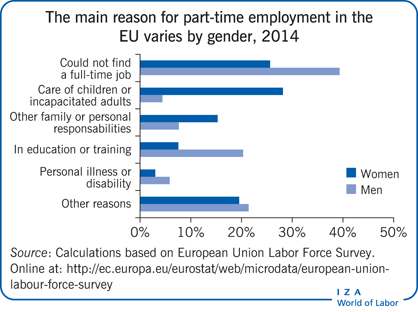Elevator pitch
About one in five workers across OECD countries is employed part-time, and the share has been steadily increasing since the beginning of the economic and financial crisis in 2007. Part-time options play an important economic role by providing more flexible working arrangements for both workers and firms. Part-time employment has also contributed substantially to increasing the employment rate, especially among women. However, part-time work comes at a cost of lower wages for workers, mainly because part-time jobs are concentrated in lower paying occupations and sectors, while the impact on firms’ productivity is still not very clear.

Key findings
Pros
Part-time employment enables more flexible work arrangements for firms and a better work-life balance for workers.
Part-time work may increase firms’ productivity by lowering employee stress and health risk and by allowing employers to better adapt to variations in demand.
Part-time work may provide a means to enter or re-enter the labor market for many workers who might otherwise simply drop out of the labor force.
In particular, part-time work has contributed to higher employment rates for women in many countries.
Cons
Part-time employment goes together with lower hourly wages, mainly because part-time jobs are concentrated in lower paying occupations and sectors.
Segregation of part-time jobs may reflect personal choices but also discrimination if part-time workers are offered only low-paying jobs and lower career opportunities.
Part-time workers increase management costs for firms, which in turn tend to invest less in their part-time workers.
If associated with low pay and temporary contracts, part-time employment raises important concerns about living standards for current workers and future pensioners.